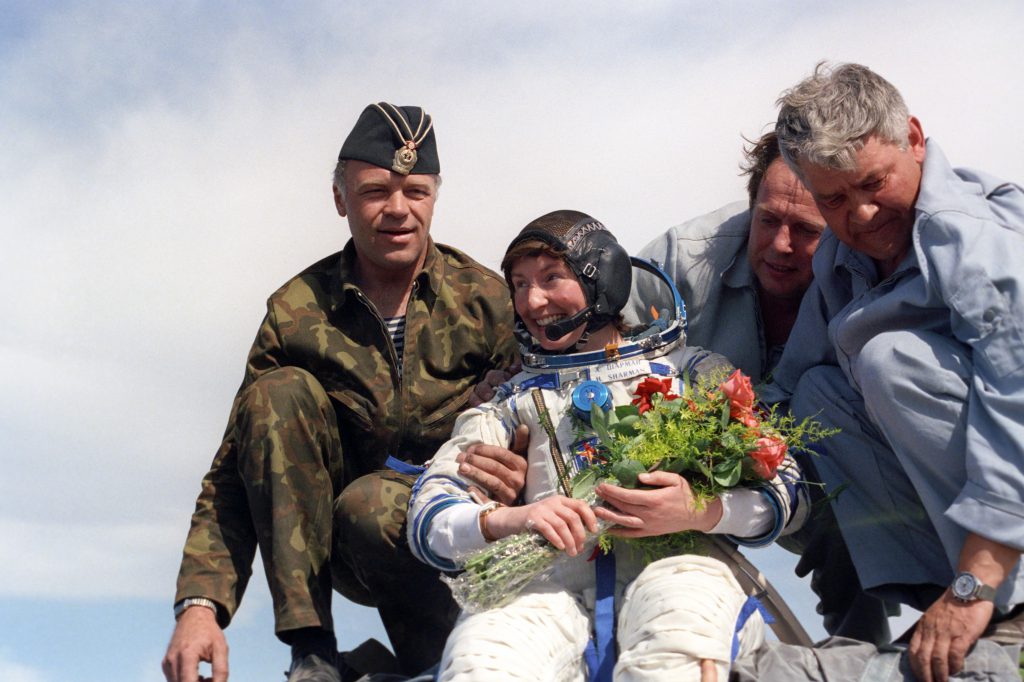A radio commercial suddenly took over the cars’ atmosphere that can only be described as jittery amidst a traffic jam on the way back from the Mars Company in Slough, Berkshire England, to her flat in Surbiton, Surrey. The radio belts: “Astronaut wanted, no experience necessary.”1 These words changed the life of 26-year old Helen Sharman…
Raised by her physicist father and nurse mother, Helen Sharman came to understand the importance of science and genuine curiosity for learning about the way things work. “If I wanted to know how a vacuum cleaner works, he could tell me. If I wanted to know how to wire a plug, he could do that. It wasn’t as though it was a weird thing that could only be learned at school – he could explain these parts of life, so science was always relevant.”2 In school, she pursued multifaceted intellectual and creative endeavors. She loved science and playing the piano. Her capacity to excel in learning foreign languages such as German and French foreshadowed her remarkable later talent in her Russian language training courses to become an astronaut. In her autobiography, Helen Sherman described her upbringing as “decidedly remarkable.” This knowledge combined with her persistent drive to achieve, prepared her for the opportunity of a lifetime, to become the first British astronaut ever to go to space. What she would do next in her career would build upon her skills in such a perfect way that made her shine so bright that she could beat out all the other 13,000 applicants for the job of astronaut!3
She earned a bachelor’s degree in Chemistry in 1984 from the University of Sheffield, England. She then took a job as an engineer for the General Electric Company in London. Her daily activities at the company consisted of organizing schedules, developing and researching on cathode ray tube components, where she took on many roles for production that often required problem solving. The talent she possessed did not go unnoticed by her employer who offered to fund her next education venture researching rare Earth ions in crystals.4 While earning her doctorate from Birkbeck College in London, she took a job as a chemist for Mars Confectionery Ltd.5 On her job at the Mars company, she developed new ice creams flavors and transitioned the factory from experimenting with flavors in a laboratory, to making factory sized production outputs. Once she completed this task, she began working with the flavor properties of chocolate to find a way to make it cheaply, efficiently, but most importantly retaining the same sugar-induced cravings that the consumer preferred over its competitors.6

Once she responded to the call to become an astronaut on board of the Soyuz TM-12 (12th expedition), the play on the words “Girl from Mars” took on a whole new meaning. Project Juno, a privately funded space mission by British companies, was supported by the Soviet Union in an attempt to forge friendship between the two countries. President Mikhail Gorbachev’s policy of Glasnost hoped to cement these friendly relations and to reform its social and economic standing in the global arena. It was a new project that had few requirements besides possessing British citizenship and falling between the ages of 21-40. The more challenging requirements included that the applicant must have formal scientific training, proven ability to learn a foreign language, and be in good physical standing. Sharman had all checked off her list. After making the cut from 13,000 applicants dow
n to 22, the new wringing of candidates produced Sharman and her backup Timothy Mace as the finalists. The only challenge was to endure the 18-month grueling of training in the Soviet Union. It included experiencing G-forces and spacewalk training. Sharman was finally measured for her suit. Once it got out that she was clear to go, the press used the tagline “Girl from Mars” anywhere and everywhere. This marketing move was hoped to have secure

d funds through major buzz. Unfortunately Britain, under Margaret Thatcher at the time, had ended the British Space Program in 1986. So this program needed to be funded privately and the $12 million requested by the Soviet Unions private investors presented an unreachable goal.7
Eventually $1.7 million U.S dollars was raised but that was only a fraction of what was needed for the joint space mission. Sharman remembers the support she received from the Prime Minister at the time. However, nationally there was no interest to put Britain into space since the space race had long simmered down.8 Following the Apollo-Soyuz Project, a U.S-Soviet unofficial peace mission in 1975, the British public did support investing millions simply to put first Briton in space. Keep in mind, Project Juno, only came to fruition in 1991, more than a decade after Apollo-Soyuz. The mission went ahead with the green-light from the Soviet Union. Since the funds expected from the UK had not been raised, the project was now entirely under the Soviet direction.9 Not only were experiments cut from the mission but the Soviets got to decide what would be experimented on.10 The venture was no longer in equal standing, however Gorbachev still extended a hand to Britain.
The Soyuz TM-12 Mission launched on May 18, 1991. It included medical and agricultural tests in space. The mission concluded within 8 days. In a conversation for an article by Sarah Everts, Helen Sharman describes what replicating experiments in space entailed. “They were very interested in growing food in space. And in the way magnetic fields affect plant growth. So how potato roots can be pulled in a certain direction if you have a strong enough magnetic field around them. We also had a miniature lemon tree. We wanted to see if we could keep it alive by supplying all the right gases. It was at the space station for three years but died eventually.” Although her work is not for the average farmer, she still acknowledges that experiments in space do not change who she is as a researcher. “-I would call us space technicians not scientists. Astronauts don’t invent the experiments. We don’t analyze the data, and by large, we don’t make conclusions.” Sharman witnessed the historic downfall of the political standing of the Soviet Union, just as she was training to become an astronaut. The close proximity to military forces in Star City, which was Northeast of Moscow, gave her a chance to see the effects that the fall of the Soviet Union had on its populations. “ …it was at a time when there was nothing in the shops in Moscow. [Soviets] wanted to share what they had with me—they were proud of their culture—but they could not buy ingredients to make food at their parties. It was a sad time for them.”11
Recounting on her time spent on the Russian Space Station, MIR, gave a glimpse into the amazing reality of the unexplored for many and the challenge of coming back. “You can’t imagine how deep the colour is,” she said. “And the detail: you can see continents, but also the wake of a ship. And, at night, the lights of cities shine up to you.

There was a window where I slept, and waking up to the world right outside … wonderful.” 12 Being the first British woman in space is an extraordinary feat but for Helen Sharman, it was just the beginning of breaking gender stereotypes that even long after her successful mission, continued to be imposed on her. Years after touring the country and educating the youth about her incredible experiences, she ended up going into hiding, regaining much of the privacy she had lost from the experience. In a surprising turn of events in 2013, the UK Space Agency named Major Tim Peake, who traveled to the International Space Station in 2015, as the first Brit in space for boarding Soyuz TMA-19M. Sharman was surprised at this sudden endorsement as they effectively replaced her as the first Brit in space. “These days, to get headlines, you have to be first or best or some superlative, and I suspect someone thought that title would get Tim more attention,” she replies. […] And, actually, he deserved that because what he’s doing is incredible.” 13
She was the first British Astronaut in space and even though she was not given the title officially because the program was not associated under ESA, she is an important part of history and a greater example of the pursuit of education, crushing gender roles, and really just being a pioneer in the late space race. Following her years of fame, she went low-profile to regain her privacy. After years of educating the public, taking interview after interview, writing multiple books detailing her journeys, she began to fade among her colleagues at Imperial College London. There she took a job at the Department of Chemistry as Operations Manager. Her journey is long and diverse. Even today she continues to make history with her knowledge just as she did on the flight to the Russian Space Station Mir. Before Tim Peake headed to board the Soyuz TMA-19, Sharman gave the greatest lesson that everyone should hear if they ever get the chance to go to space, “ look out the window as much as you can.”
- James Blitz, Baikonur, and Maurice Chittenden, “Helen from Mars takes the Soviet highway to the stars; Helen Sharman,” Sunday Times, May 19, 1991, http://search.ebscohost.com/login.aspx?direct=true&db=edsgea&AN=edsgcl.117271983&site=eds-live&scope=site. ↵
- Jamie Durrani, “Astronauts Wanted, No Experience Required,” July 19, 2019, RSC Education, https://edu.rsc.org/feature/astronauts-wanted-no-experience-required/3010749.article. ↵
- Umberto Cavallaro, Women Spacefarers : Sixty Different Paths to Space (Cham, Switzerland: Springer, 2017), 115-116. ↵
- Umberto Cavallaro, Women Spacefarers : Sixty Different Paths to Space (Cham, Switzerland: Springer, 2017), 115. ↵
- Adam Augustyn, “Helen Sharman,” Encyclopedia Britannica, January 24, 2020, https://www.britannica.com/biography/Helen-Sharman. ↵
- Umberto Cavallaro, Women Spacefarers : Sixty Different Paths to Space (Cham, Switzerland: Springer, 2017), 115. ↵
- Umberto Cavallaro, Women Spacefarers : Sixty Different Paths to Space (Cham, Switzerland: Springer,
2017), 113-119. ↵
- Helen Sharman, “Helen Sharman CMG OBE, Frequently Asked Questions.” Accessed February 14, 2020, http://www.helensharman.uk/frequently-asked-questions/. ↵
- Adam Vaughan, “I am angered by the fact that we’re destroying Earth,” New Scientist 243, no. 3249 (September 2019): 42-43. ↵
- James Blitz, Baikonur, and Maurice Chittenden, “Helen from Mars takes the Soviet highway to the stars; Helen Sharman,” Sunday Times, May 19, 1991, http://search.ebscohost.com/login.aspx?direct=true&db=edsgea&AN=edsgcl.117271983&site=eds-live&scope=site. ↵
- Sarah Everts, “A Conversation with Helen Sharman,” ACS Central Science 2, no. 8 (2016): 486-488. ↵
- Colin Drury, “Blast off! Why Has Astronaut Helen Sharman Been Written out of History?” April 18, 2016, Guardian News and Media, https://www.theguardian.com/lifeandstyle/2016/apr/18/blast-off-why-has-astronaut-helen-sharman-been-written-out-of-history. ↵
- Colin Drury, “Blast off! Why Has Astronaut Helen Sharman Been Written out of History?” April 18, 2016, Guardian News and Media, https://www.theguardian.com/lifeandstyle/2016/apr/18/blast-off-why-has-astronaut-helen-sharman-been-written-out-of-history. ↵



64 comments
Thiffany Yeupell
This path to becoming an astronaut seems somewhat unconventional to me, but whatever accomplishes the goal is what matters truly. With only an ad on the radio, it was set that Sharman was going into space. Although her path was not as straightforward, as the USSR collapsed and credit was lost, I imagine Sharman had absolutely enjoyed this time period in her life, a once-in-a-life experience that many do not get the chance to participate and observe in.
Amanda Shoemaker
This is the first article I’ve ever read about any space explorer that wasn’t an American astronaut. I like that this article talks a lot about how her father inspired her to learn and be curious about how things worked. It’s also interesting how Helen seemed to have such a large multitude of skills. It’s almost not surprising at all that she was chosen out of such a large group of competitors. It’s sad that she was overshadowed as not being the first Brit in space but she seemed to take it with grace and I feel like that makes her an even better role model for younger generations.
Vanessa Barron Ortiz
Very well written article. It is surprising to learn that despite all the challenges Helen Sharman’s space team faced they were finally able to go to space. It is frustrating to learn that even after all of her work she didn’t get the recognition for being the first brit in space. I do understand that after being in the spotlight for space travel all Helen wanted to do was go back to normal (having privacy).
Matthew Avila
very informative article! I think it was crazy for her to hear about the open Astronaut position on the radio. I truly believe she was destined to take that mission because she grew up around science and she herself was a chemist and did research. everything happens for a reason and for her things just naturally fell into place. I do think it was unfair though that she wasn’t able to be recognized as the first British astronaut even though she went through the whole process.
Stephen Talik
The drastic changes in the attitude of Russia with regards to working with other countries to try to build ties back then was really amazing. In the middle of the Cold War, they never would have dreamed of funding a space program with Britain, much less footing the entire bill for the whole operation.
Alexandria Garcia
This was a great and well written piece on women in science. It’s wonderful to read about someone internationally that has gone to great heights for women in history and how her background was a key foundation for her career. Keep up the great work!!
Lulu Guadalupe Avitua-Uviedo
This article was very interesting, I’ve personally never heard about this, thank you for letting us know how women can be equally involved in space. What I really liked was the beginning of the article when she spoke of her father, not everyone is so lucky to have such a supportive father who is willing to teach their child about life and the world. I also thought it was interesting of the science she put into ice cream flavors. Good article, very informative.
Giselle Garcia
I’m glad I came across this wonderful article! I haven’t heard of this woman, Helen Sharman, who was the first British woman to go to space. Her journey to becoming selected to go to space is amazing; she had all the qualifications and I could tell she is a very intelligent woman. Sadly, someone else was officially recognized as the first Brit in space, however, she represents one of the many women in STEM who have broken gender barriers.
Nelly Perez
What surprised me was how an advertisement bluntly asked for an astronaut with no experience as a requirement. Helen had a passion for science because she grew up with her father being a physicist. She learned more than one language that was worth it in the end for her future as an astronaut. Her other jobs were beneficial because they required problem solving and she was able to solve problems.
BARBARA GUAJARDO
It’s amazing to hear of yet another story of a woman making history and making the impossible,possible. Helena Sharman has now proven how women can do anything they put there minds to….GOOD JOB KENDALL!